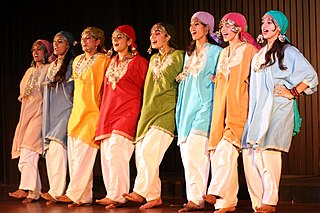Kak is a Kashmiri Pandit surname originating in the Kashmir Valley of Jammu and Kashmir, India.

Kashmiris are an Indo-Aryan ethnolinguistic group speaking the Kashmiri language and originating from the Kashmir Valley, which is today located in Indian-administered Jammu and Kashmir.
Sapru, also spelled as Sipru or Saproo is a Kashmiri Pandit clan and surname native to the Kashmir Valley of Jammu and Kashmir, India.
Mattoo, also spelled Mattu, is a Kashmiri Pandit clan and surname native to the Kashmir Valley in Jammu & Kashmir, India.
Haksar is a Kashmiri Pandit surname and clan. They are native to the Kashmir Valley within the Indian state of Jammu and Kashmir and they have a long tradition of Indian administrative service based on fluency in a link language - Persian under the Mughals and English under the British. In light of this fact, the Haksar family historically became a prominent administrative family in other parts of India, namely in Indore and Gwalior.
Jalali is a Kashmiri surname. Notable people with the surname include:
Bhan is a Kashmiri Pandit clan and surname native to the Kashmir Valley of Jammu and Kashmir, India. The Bhan Brahmin dynasty founded an erstwhile tribal hill state of Kashmir in the 10th century AD. It was ruled by the Bhan dynasty for two hundred years. Currently, all the territory of this state of Bhan is found in the Sudhanoti District of Azad Kashmir administered by Pakistan. Bhan, as a surname, is also used by Punjabi Saraswat Brahmins.
Razdan is a Kashmiri Pandit surname and clan that refers to the royal or aristocratic bloodline of old Kashmir, mostly attributed to the warriors of the Kashmir Valley of Jammu and Kashmir, India. They are Saraswat Brahmins from the Kashmir Valley, belonging to the larger community of Pancha-Gauda Brahmins, and are widely known for their allegiance to Lord Shiva.
Pandit or Pandita is a Kashmiri Pandit clan and surname, native to the Kashmir Valley in Jammu and Kashmir, India.
Gurtu or Gurtoo is a Kashmiri Pandit clan or surname, native to the Kashmir Valley in Jammu and Kashmir, India.
Wali is a Kashmiri surname. Notable people with the name include:
Bazaz is a Kashmiri Pandit clan and surname native to the Kashmir Valley of the Indian union territory of Jammu and Kashmir.
Tikoo, also spelt as Tickoo, Tikku, Tikhu or Ticku is a Kashmiri Pandit clan and surname native to the Kashmir Valley of the Indian union territory of Jammu and Kashmir.
Thussu, also spelt as Thusu, Thusoo or Thussoo is a Kashmiri clan and surname native to the Kashmir Valley of the Indian union territory of Jammu and Kashmir. Thussu as a last-name is used by both Kashmiri Hindus and Kashmiri Muslims.
Parimoo or Parimu is a Kashmiri Pandit clan and surname native to the Kashmir Valley of Jammu and Kashmir, India. It is used by both Kashmiri Hindus and Kashmiri Muslims.
Ganjoo, also spelt as Ganju is a Kashmiri Pandit clan or surname, native to the Kashmir Valley in Jammu and Kashmir, India.
Saraf is a Kashmiri Pandit clan and surname native to the Kashmir Valley of the Indian union territory of Jammu and Kashmir.
Drabu or Draboo is a Kashmiri Pandit clan or surname, native to the Kashmir Valley in Jammu and Kashmir, India. Drabu or Draboo as a last name is shared by both Hindus and Muslims in Kashmir.

